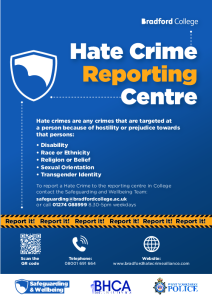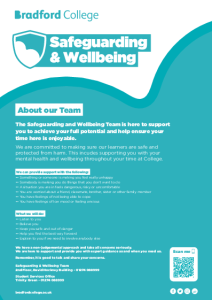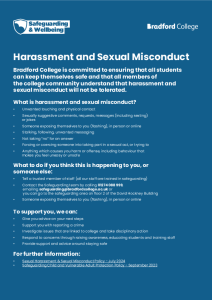Safeguarding and Mental Health Support
Useful Organisations & Resources
Domestic abuse as an incident or pattern of incidents of controlling, coercive, threatening, degrading and violent behaviour, including sexual violence, in the majority of cases by a partner or ex-partner, but also by a family member or carer. It is very common. In the vast majority of cases it is experienced by women and is perpetrated by men.
Domestic abuse can include, but is not limited to, the following:
Coercive Control (a pattern of intimidation, degradation, isolation and control with the use or threat of physical or sexual violence)
- Apply for your Bradford College Bursary Here
- Citizens Advice
- Step Change Debt Charity
- Christians Against Poverty
- The Money Advice Service
A food bank is a community-based organization that provides emergency food and sometimes other essential supplies to individuals and families facing food insecurity. If you require a referral please contact the safeguarding team.
- Unwanted touching and physical contact
- Sexually suggestive comments, requests, messages (including sexting) or jokes
- Someone exposing themselves to you (flashing), in person or online
- Stalking, following, unwanted messaging
- Not taking “no” for an answer
- Forcing or coercing someone into taking part in a sexual act, or trying to
- Anything which causes you harm or offense, including behaviour that makes you feel uneasy or unsafe
- Tell a trusted member of staff (all our staff are trained in safeguarding)
- Contact the Safeguarding team by calling 01274 088 999, emailing [email protected] or you can go to the safeguarding area on floor 2 of the David Hockney Building
- Someone exposing themselves to you (flashing), in person or online
- Give you advice on your next steps
- Support you with reporting a crime
- Investigate issues that are linked to college and take disciplinary action
- Respond to concerns through raising awareness, educating students and training staff
- Provide support and advice around staying safe



